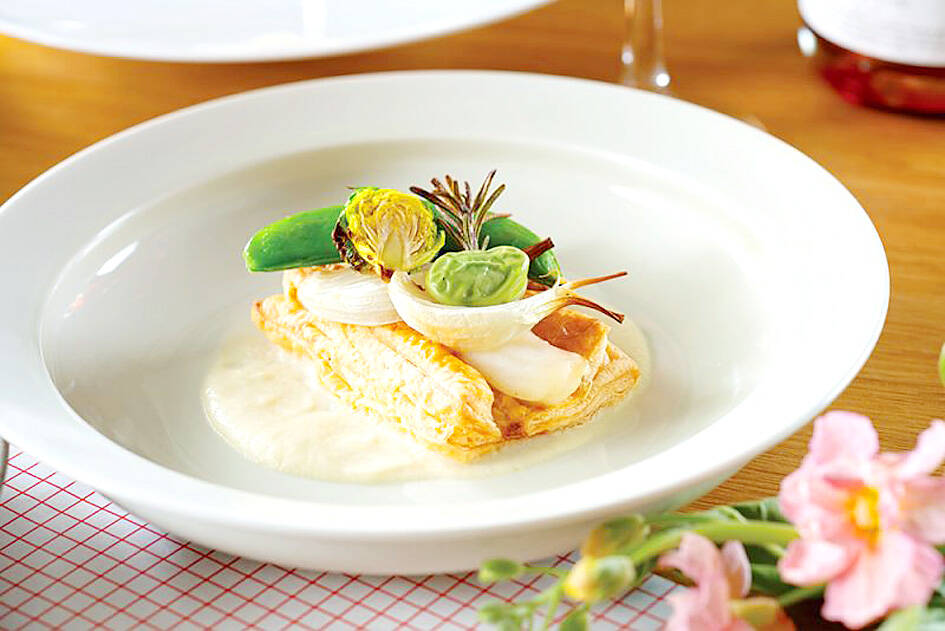FOOD
Special dish to be launched
The Ministry of Agriculture yesterday said it and Nishi-Nippon Railroad Co would jointly launch a spring special offer on hybrid tiger giant grouper dishes from Thursday next week. The dishes would be made by Michelin-starred chefs, including fish on spring vegetable mille-feuille with marmalade. It would be available on Nishi-Nippon Railroad’s tourist trains for three months, while Taiwan-style grouper fillet and bento would be sold at the railway company’s supermarkets from next month. Japan has permitted imports of the hybrid grouper from Taiwan since October last year. The ministry collaborated with Nishi-Nippon Railroad to promote the fish among Japanese.

SPORTS
Crowds expected at Dome
A near full house is expected at the 40,000-capacity Taipei Dome for Taiwan’s decisive 2026 World Baseball Classic (WBC) qualifying playoff against Spain tonight. All additional NT$500 tickets released for today’s game were snapped up within seconds of going on sale, tixCraft said. Capacity was increased after a loss to Nicaragua consigned Taiwan to the second-versus-third playoff on Sunday. The four-team qualifying tournament at the Taipei Dome, one of two for the WBC, comprises a six-game round-robin and a single-elimination playoff for the teams finishing second and third. Taiwan finished third in the round-robin section following a 12-5 loss to Spain, a 9-1 win over South Africa and a 6-0 defeat to Nicaragua, which clinched them a spot at next year’s WBC. Taiwan’s previous qualifier games saw strong attendance, drawing 35,325 fans against Spain on Friday, 35,868 against South Africa on Saturday and 35,565 against Nicaragua on Sunday.
POLITICS
Taichung mayor visits Japan
Taichung Mayor Lu Shiow-yen (盧秀燕) departed for Japan yesterday to focus on city diplomacy and to study Japan’s domed stadiums to help accelerate the construction of Taichung’s large multi-purpose dome. Speaking to reporters before her departure, Lu emphasized Japan’s significance as a key partner for Taiwan and Taichung. The six-day trip is her first visit to Japan since taking office six years ago. It includes stops in Sapporo, Nagoya and Tokyo, with four days dedicated to official engagements, she said. Lu said her delegation would visit four of Japan’s domed stadiums, and study their functions, operational models and financial strategies. Construction of Taichung Arena is under way, while the city plans to build another domed stadium capable of hosting baseball games and large-scale international performances, Lu said.
HEALTH
Premier issues ER order
Premier Cho Jung-tai (卓榮泰) yesterday instructed the Ministry of Health and Welfare to report on measures to address overcrowding in hospital emergency rooms (ER) across the country, Cabinet spokeswoman Michelle Lee (李慧芝) said. Due to unprecedented overcrowding in ERs, the Taiwan Society of Emergency Medicine on Saturday issued a rare call for help, saying that if the situation worsens, hospitals could face a mass resignation of emergency medical workers. Lee said the number of patients seeking emergency treatment for flu-related complications this season has been several times higher than in the past nine years. The ministry said it would continue to assist hospitals in allocating medical staff and hospital beds, and improving triage systems and patient transfers, while some medical institutions have initiated internal staff adjustments.

Taiwan yesterday condemned the recent increase in Chinese coast guard-escorted fishing vessels operating illegally in waters around the Pratas Islands (Dongsha Islands, 東沙群島) in the South China Sea. Unusually large groupings of Chinese fishing vessels began to appear around the islands on Feb. 15, when at least six motherships and 29 smaller boats were sighted, the Coast Guard Administration (CGA) said in a news release. While CGA vessels were dispatched to expel the Chinese boats, Chinese coast guard ships trespassed into Taiwan’s restricted waters and unsuccessfully attempted to interfere, the CGA said. Due to the provocation, the CGA initiated an operation to increase

CHANGING LANDSCAPE: Many of the part-time programs for educators were no longer needed, as many teachers obtain a graduate degree before joining the workforce, experts said Taiwanese universities this year canceled 86 programs, Ministry of Education data showed, with educators attributing the closures to the nation’s low birthrate as well as shifting trends. Fifty-three of the shuttered programs were part-time postgraduate degree programs, about 62 percent of the total, the most in the past five years, the data showed. National Taiwan Normal University (NTNU) discontinued the most part-time master’s programs, at 16: chemistry, life science, earth science, physics, fine arts, music, special education, health promotion and health education, educational psychology and counseling, education, design, Chinese as a second language, library and information sciences, mechatronics engineering, history, physical education

The Chinese military has boosted its capability to fight at a high tempo using the element of surprise and new technology, the Ministry of National Defense said in the Quadrennial Defense Review (QDR) published on Monday last week. The ministry highlighted Chinese People’s Liberation Army (PLA) developments showing significant changes in Beijing’s strategy for war on Taiwan. The PLA has made significant headway in building capabilities for all-weather, multi-domain intelligence, surveillance, operational control and a joint air-sea blockade against Taiwan’s lines of communication, it said. The PLA has also improved its capabilities in direct amphibious assault operations aimed at seizing strategically important beaches,

‘MALIGN PURPOSE’: Governments around the world conduct espionage operations, but China’s is different, as its ultimate goal is annexation, a think tank head said Taiwan is facing a growing existential threat from its own people spying for China, experts said, as the government seeks to toughen measures to stop Beijing’s infiltration efforts and deter Taiwanese turncoats. While Beijing and Taipei have been spying on each other for years, experts said that espionage posed a bigger threat to Taiwan due to the risk of a Chinese attack. Taiwan’s intelligence agency said China used “diverse channels and tactics” to infiltrate the nation’s military, government agencies and pro-China organizations. The main targets were retired and active members of the military, persuaded by money, blackmail or pro-China ideology to steal